
According to Abrahamic religions, Aaron was a Jewish prophet, a high priest, and the elder brother of Moses. Information about Aaron comes exclusively from religious texts, such as the Hebrew Bible, the New Testament, and the Quran.
The Book of Exodus is the second book of the Bible. It is a narrative of the Exodus, the origin myth of the Israelites leaving slavery in Biblical Egypt through the strength of their deity named Yahweh, who according to the story chose them as his people. The Israelites then journey with the legendary prophet Moses to Mount Sinai, where Yahweh gives the Ten Commandments and they enter into a covenant with Yahweh, who promises to make them a "holy nation, and a kingdom of priests" on condition of their faithfulness. He gives them their laws and instructions to build the Tabernacle, the means by which he will come from heaven and dwell with them and lead them in a holy war to conquer Canaan, which has earlier, according to the myth of Genesis, been promised to the "seed" of Abraham, the legendary patriarch of the Israelites.
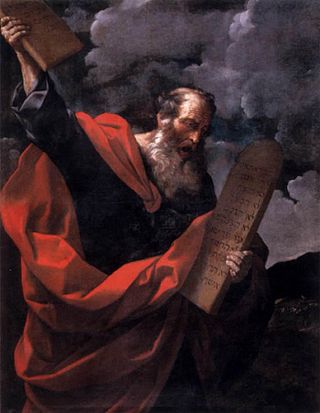
Moses was a Hebrew prophet, teacher and leader according to Abrahamic tradition. He is considered the most important prophet in Judaism and Samaritanism, and one of the most important prophets in Christianity, Islam, the Baháʼí Faith, and other Abrahamic religions. According to both the Bible and the Quran, Moses was the leader of the Israelites and lawgiver to whom the prophetic authorship of the Torah is attributed.

Aaron's rod refers to any of the walking sticks carried by Moses' brother, Aaron, in the Torah. The Bible tells how, along with Moses's rod, Aaron's rod was endowed with miraculous power during the Plagues of Egypt that preceded the Exodus. Later, his rod miraculously sprouted blossoms and almonds to symbolize God's choice of Aaron and his tribe for holy service.
Abiram, also spelled Abiron, is the name of two people in the Old Testament.
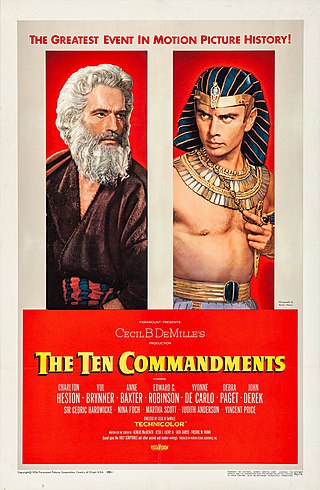
The Ten Commandments is a 1956 American epic religious drama film produced, directed, and narrated by Cecil B. DeMille, shot in VistaVision, and released by Paramount Pictures. The film is based on the 1949 novel Prince of Egypt by Dorothy Clarke Wilson, the 1859 novel Pillar of Fire by J. H. Ingraham, the 1937 novel On Eagle's Wings by A. E. Southon, and the Book of Exodus, found in the Bible. The Ten Commandments dramatizes the biblical story of the life of Moses, an adopted Egyptian prince who becomes the deliverer of his real brethren, the enslaved Hebrews, and thereafter leads the Exodus to Mount Sinai, where he receives, from God, the Ten Commandments. The film stars Charlton Heston in the lead role, Yul Brynner as Rameses, Anne Baxter as Nefretiri, Edward G. Robinson as Dathan, Yvonne De Carlo as Zipporah, Debra Paget as Lilia, and John Derek as Joshua; and features Sir Cedric Hardwicke as Seti I, Nina Foch as Bithiah, Martha Scott as Yochabel, Judith Anderson as Memnet, and Vincent Price as Baka, among others.

In Jewish and Christian traditions, Jannes and Jambres are the names given to magicians mentioned in the Book of Exodus. This naming tradition is well-attested in ancient and medieval literature. In Latin manuscripts of the New Testament, and in Latin writing traditions, their names are known as Jamnes and Mambres.

Korah, son of Izhar, is an individual who appears in the Biblical Book of Numbers of the Old Testament and four different verses in the Quran, known for leading a rebellion against Moses. Some older English translations, as well as the Douay–Rheims Bible, spell the name Core, and many Eastern European translations have "Korak" or "Korey".

According to the Torah and the Quran, the golden calf was a cult image made by the Israelites when Moses went up to Mount Sinai. In Hebrew, the incident is known as "the sin of the calf". It is first mentioned in the Book of Exodus.

The Jahwist, or Yahwist, often abbreviated J, is one of the most widely recognized sources of the Pentateuch (Torah), together with the Deuteronomist, the Priestly source and the Elohist. The existence of the Jahwist text is somewhat controversial, with a number of scholars, especially in Europe, denying that it ever existed as a coherent independent document. Nevertheless, many scholars do assume its existence. The Jahwist is so named because of its characteristic use of the term Yahweh for God.

The Exodus is the founding myth of the Israelites whose narrative is spread over four of the five books of the Pentateuch. The narrative of the Exodus describes a history of Egyptian bondage of the Israelites followed by their exodus from Egypt through a passage in the Red Sea, in pursuit of the Promised Land under the leadership of Moses.

The Ten Commandments is a 1923 American silent religious epic film produced and directed by Cecil B. DeMille. Written by Jeanie MacPherson, the film is divided into two parts: a prologue recreating the biblical story of the Exodus and a modern story concerning two brothers and their respective views of the Ten Commandments.
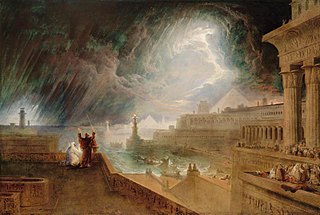
Va'eira, Va'era, or Vaera is the fourteenth weekly Torah portion in the annual Jewish cycle of Torah reading and the second in the Book of Exodus. It constitutes Exodus 6:2–9:35. The parashah tells of the first seven Plagues of Egypt.

Bemidbar, BeMidbar, B'midbar, Bamidbar, or Bamidbor, is the 34th weekly Torah portion in the annual Jewish cycle of Torah reading and the first in the Book of Numbers. The parashah tells of the census and the priests' duties. It constitutes Numbers 1:1–4:20. The parashah is made up of 7,393 Hebrew letters, 1,823 Hebrew words, 159 verses, and 263 lines in a Torah Scroll. Jews generally read it in May or early June.

Korach or Korah is the 38th weekly Torah portion in the annual Jewish cycle of Torah reading and the fifth in the Book of Numbers. It tells of Korach's failed attempt to overthrow Moses.
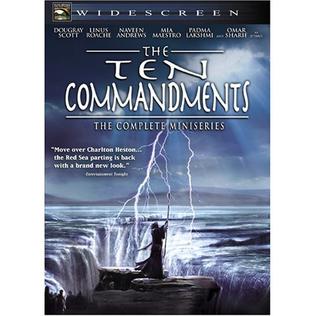
The Ten Commandments is a 2006 miniseries that dramatizes the Biblical story of Moses. It aired on ABC.
The Korahites in the Bible were that portion of the Kohathites that descended from the Sons of Korah. They were an important branch of the singers of the Kohathite division.

Discussions in rabbinic literature of the biblical character Moses, who led the Israelites out of Egypt and through their wanderings in the wilderness, contain various expansions, elaborations and inferences beyond what is presented in the text of the Bible itself.
Rabbah bar bar Hana was a Jewish Talmudist who lived in Babylonia, known as an Amora of the second generation.
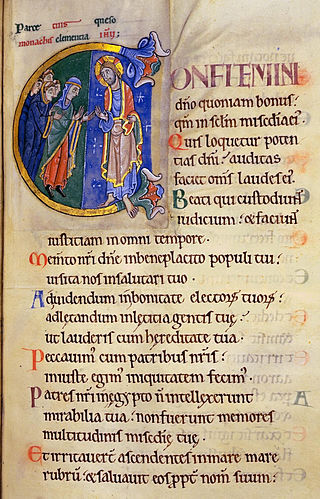
Psalm 106 is the 106th psalm of the Book of Psalms, beginning in English in the King James Version: "Praise ye the LORD. O give thanks unto the LORD; for he is good". The Book of Psalms is part of the third section of the Hebrew Bible, and a book of the Christian Old Testament. In the slightly different numbering system used in the Greek Septuagint and Latin Vulgate translations of the Bible, this psalm is Psalm 105. In Latin, it is known by the incipit, "Confitemini Domino quoniam bonus". Alexander Kirkpatrick observes that the two historical psalms, Psalms 105 and 106, are closely related. Psalm 105 gives thanks for God's faithfulness to the covenant he made with Abraham; Psalm 106 is a psalm of penitence, reciting the history of Israel's faithlessness and disobedience. He also notes that this psalm and Psalm 107 "are closely connected together", arguing that "the division of the fourth and fifth books does not correspond to any difference of source or character, as is the case in the other books".

















